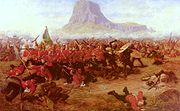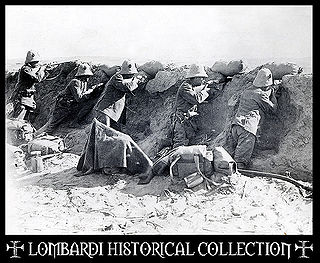
Colonial war
Encyclopedia

powers creating a colony
Colony
In politics and history, a colony is a territory under the immediate political control of a state. For colonies in antiquity, city-states would often found their own colonies. Some colonies were historically countries, while others were territories without definite statehood from their inception....
. The term usually refers to wars fought during the nineteenth century between Europe
Europe
Europe is, by convention, one of the world's seven continents. Comprising the westernmost peninsula of Eurasia, Europe is generally 'divided' from Asia to its east by the watershed divides of the Ural and Caucasus Mountains, the Ural River, the Caspian and Black Seas, and the waterways connecting...
an armies in Africa
Africa
Africa is the world's second largest and second most populous continent, after Asia. At about 30.2 million km² including adjacent islands, it covers 6% of the Earth's total surface area and 20.4% of the total land area...
, Asia
Asia
Asia is the world's largest and most populous continent, located primarily in the eastern and northern hemispheres. It covers 8.7% of the Earth's total surface area and with approximately 3.879 billion people, it hosts 60% of the world's current human population...
and the Caribbean
Caribbean
The Caribbean is a crescent-shaped group of islands more than 2,000 miles long separating the Gulf of Mexico and the Caribbean Sea, to the west and south, from the Atlantic Ocean, to the east and north...
.
The wars may be split into several categories.
A revolt of the indigenous population against rule by the Imperial power. In the 19th century these were rarely successful due to the technological and organisational superiority of the Imperial forces. One notable success was the Haitian slave revolt against French rule. In the 20th century these types of conflict were often termed "Wars of National Liberation" and due to better armaments and a heavily politicised leadership strategy achieved much better results by wearing down the will of the Imperial power to continue with an expensive and politically unpopular struggle rather than militarily defeating them, although the Vietnamese also managed the latter against the French at Dien Bien Phu
Dien Bien Phu
Điện Biên Phủ is a city in northwestern Vietnam. It is the capital of Dien Bien province, and is known for the events there during the First Indochina War, the Battle of Dien Bien Phu, during which the region was a breadbasket for the Việt Minh.-Population:...
in 1954 leading to their expulsion from Indo-China.
A second category was the war of self-determination by settlers and descendants of settlers against rule by the "mother" country. This did not necessarily involve what was left of any indigenous population but often took the form of a civil war between supporters of the status quo and revolutionaries. The prime example of this was the American War of Independence against British rule followed by the various South American Wars of Liberation against the Spanish Empire. Success was often dependent on external factors and alliances, the American colonists were helped by the French winning naval superiority at a crucial time and the Greek War of Independence against the Ottoman empire was aided by the destruction of the Turkish fleet at Navarino by a combined Anglo/French/Russian fleet.
A third category was the conflict with neighbours of the colony as part of Imperial policy, either expansionism such as the Anglo-Zulu and Anglo-Boer wars of the late nineteenth century and the Italian attack on Abyssinia or as part of a wider conflict such as the World War I campaigns between British/Belgian/French colonial forces and their German neighbours in Africa and Asia.
Victory against colonial powers
Although colonial wars usually resulted in victory for the European forces in the long term, there were several defeats for their forces especially in the early stages of a conflict when the Imperial power had not brought its full force to bear. These include the Battle of Isandhlwana and the Battle of AdowaBattle of Adowa
The Battle of Adwa was fought on 1 March 1896 between Ethiopia and Italy near the town of Adwa, Ethiopia, in Tigray...
where over-confident European forces were defeated by native African soldiery. In both of these battles, the African armies greatly outnumbered the European armies, suffered heavy casualties but overwhelmed their enemy.

Examples
Examples of colonial wars include the Java WarJava War
The Java War or Diponegoro War was fought in Java between 1825 and 1830. It started as a rebellion led by Prince Diponegoro. The proximate cause was the Dutch decision to build a road across a piece of his property that contained his parents' tomb...
, the Indian Rebellion
Indian Rebellion of 1857
The Indian Rebellion of 1857 began as a mutiny of sepoys of the British East India Company's army on 10 May 1857, in the town of Meerut, and soon escalated into other mutinies and civilian rebellions largely in the upper Gangetic plain and central India, with the major hostilities confined to...
, and various conflicts waged during the Scramble for Africa
Scramble for Africa
The Scramble for Africa, also known as the Race for Africa or Partition of Africa was a process of invasion, occupation, colonization and annexation of African territory by European powers during the New Imperialism period, between 1881 and World War I in 1914...
, such as the Anglo-Zulu War
Anglo-Zulu War
The Anglo-Zulu War was fought in 1879 between the British Empire and the Zulu Kingdom.Following the imperialist scheme by which Lord Carnarvon had successfully brought about federation in Canada, it was thought that a similar plan might succeed with the various African kingdoms, tribal areas and...
and the Mahdist War
Mahdist War
The Mahdist War was a colonial war of the late 19th century. It was fought between the Mahdist Sudanese and the Egyptian and later British forces. It has also been called the Anglo-Sudan War or the Sudanese Mahdist Revolt. The British have called their part in the conflict the Sudan Campaign...
. The Anglo-Ashanti Wars of the late 1800s were a typical example of colonial warfare, in which small British
United Kingdom
The United Kingdom of Great Britain and Northern IrelandIn the United Kingdom and Dependencies, other languages have been officially recognised as legitimate autochthonous languages under the European Charter for Regional or Minority Languages...
armies, equipped with modern artillery
Artillery
Originally applied to any group of infantry primarily armed with projectile weapons, artillery has over time become limited in meaning to refer only to those engines of war that operate by projection of munitions far beyond the range of effect of personal weapons...
and machine gun
Machine gun
A machine gun is a fully automatic mounted or portable firearm, usually designed to fire rounds in quick succession from an ammunition belt or large-capacity magazine, typically at a rate of several hundred rounds per minute....
s, repeatedly defeated much larger forces of local warriors. During the 19th century and early 20th century colonial period there was endemic warfare on the frontiers of many colonies in tribal areas, notably for the British Empire on the North West frontier of India, for the French and Spanish in their North African colonies and for the United States in North America.
See also
- ColonialismColonialismColonialism is the establishment, maintenance, acquisition and expansion of colonies in one territory by people from another territory. It is a process whereby the metropole claims sovereignty over the colony and the social structure, government, and economics of the colony are changed by...
- InsurgencyInsurgencyAn insurgency is an armed rebellion against a constituted authority when those taking part in the rebellion are not recognized as belligerents...
and counter-insurgencyCounter-insurgencyA counter-insurgency or counterinsurgency involves actions taken by the recognized government of a nation to contain or quell an insurgency taken up against it... - Spice tradeSpice tradeCivilizations of Asia were involved in spice trade from the ancient times, and the Greco-Roman world soon followed by trading along the Incense route and the Roman-India routes...
- Dutch-Portuguese WarDutch-Portuguese WarThe Dutch–Portuguese War was an armed conflict involving Dutch forces, in the form of the Dutch East India Company and the Dutch West India Company, against the Portuguese Empire. Beginning in 1602, the conflict primarily involved the Dutch companies invading Portuguese colonies in the Americas,...
- Le Fanion de la LégionLe Fanion de la LégionLe Fanion de la Légion , is a French song created in 1936 by Marie Dubas, with lyrics from Raymond Asso and music from Marguerite Monnot, and which was later taken upby Edith Piaf and became identified with her.- The song :...
- Zulu (film)Zulu (film)Zulu is a 1964 historical war film depicting the Battle of Rorke's Drift between the British Army and the Zulus in January 1879, during the Anglo-Zulu War....
- Battle of Isandhlwana
- Malayan EmergencyMalayan EmergencyThe Malayan Emergency was a guerrilla war fought between Commonwealth armed forces and the Malayan National Liberation Army , the military arm of the Malayan Communist Party, from 1948 to 1960....
- Philippine RevolutionPhilippine RevolutionThe Philippine Revolution , called the "Tagalog War" by the Spanish, was an armed military conflict between the people of the Philippines and the Spanish colonial authorities which resulted in the secession of the Philippine Islands from the Spanish Empire.The Philippine Revolution began in August...
- Portuguese Colonial WarPortuguese Colonial WarThe Portuguese Colonial War , also known in Portugal as the Overseas War or in the former colonies as the War of liberation , was fought between Portugal's military and the emerging nationalist movements in Portugal's African colonies between 1961 and 1974, when the Portuguese regime was...
- Italo-Turkish WarItalo-Turkish WarThe Italo-Turkish or Turco-Italian War was fought between the Ottoman Empire and the Kingdom of Italy from September 29, 1911 to October 18, 1912.As a result of this conflict, Italy was awarded the Ottoman provinces of Tripolitania, Fezzan, and...
- First Italo–Ethiopian War
- Second Italo-Abyssinian WarSecond Italo-Abyssinian WarThe Second Italo–Abyssinian War was a colonial war that started in October 1935 and ended in May 1936. The war was fought between the armed forces of the Kingdom of Italy and the armed forces of the Ethiopian Empire...
- East African Campaign (World War I)East African Campaign (World War I)The East African Campaign was a series of battles and guerrilla actions which started in German East Africa and ultimately affected portions of Mozambique, Northern Rhodesia, British East Africa, Uganda, and the Belgian Congo. The campaign was effectively ended in November 1917...
- East African Campaign (World War II)East African Campaign (World War II)The East African Campaign was a series of battles fought in East Africa during World War II by the British Empire, the British Commonwealth of Nations and several allies against the forces of Italy from June 1940 to November 1941....
- Battle of AdowaBattle of AdowaThe Battle of Adwa was fought on 1 March 1896 between Ethiopia and Italy near the town of Adwa, Ethiopia, in Tigray...
- Society of Colonial Wars

